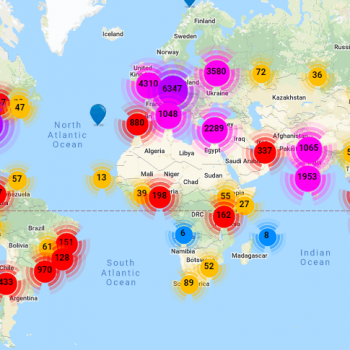Startup ecosystems are on the rise globally, and are becoming a focal point of governments wanting to improve local economies. However, growth of a startup ecosystem can’t happen overnight. It takes time and effort to nurture startup ecosystems by the entrepreneurial community and the government, and should be considered a long term investment. Over years, strong startup ecosystems are directly linked to the growth of local and urban economies.
Some great examples of countries that invested in developing their startup ecosystem early on are Estonia and Israel. They are home to companies like Skype, TransferWise, Wix, Waze, etc. Estonia and Israel have used a startup-encouraging approach that has helped these two countries move from underdeveloped to developed economies due to startup activity. Despite not being resource rich and having a tiny population, Estonia has come a long way after becoming startup-savvy. Likewise for Israel, coming from an underdeveloped, war-torn background, a startup boom helped grow its economy and made it a developed nation globally recognized as a startup hub.
To know more about the leading startup economies, download our latest report here.
Effects and benefits of startup ecosystem on urban economies
Most countries are now readily embracing and adapting to this change of having an economy driven by startups and innovation. Apart from generating more jobs, a successful startup ecosystem also brings liveliness and positive vibes to the culture while increasing the standard of living in that city. Hence, most cities vie to achieve this growth. Although the growth and change of startup ecosystem requires time and investment, governments are launching great initiatives to support their growth as a long term vision to boost their urban economies and job markets.
Before we dive deeper into the impact of startup ecosystems on economies, we should mention that one of the pillars of the growth of the startup ecosystem is having visibility and data regarding its current status. This puts special importance on the need of high-quality startup ecosystem research. Currently, there is a very low amount of viable research on the topic of local and global startup ecosystems, and StartupBlink is aiming to change that with our annual report ranking over 954 cities and 125 countries globally. Such reports and research can greatly benefit governments, startup, and entrepreneurial community and even large corporations.
Some benefits of having a robust startup ecosystem on local economies are:
Creating jobs and attracting a talent pool
Mature startups have the potential to create many jobs in the future as they grow. About 2 million jobs globally were created by startups alone in 2015. Any country investing in creating a thriving startup ecosystem is supporting the future employment of millions of people locally and even globally. Apart from startups creating jobs, there are other supporting businesses that are created by successful startup ecosystem, such as coworking spaces, accelerators, investment firms, and general service providers of all sorts who cater those startups and their employees. All this creates a spike of jobs and greatly benefits the local economy.
Additionally, startups create a talent pool. Most startup employees are freshers or younger than average. Working in startups, they get trained and become versatile in many skills. Essentially, startups are becoming training workshops, and local economies benefit from this creation of a talented work pool.
Likewise, to support a thriving community of startups and to create a local talent pool, educational institutions tend to develop locally. An example for this would be several highly ranked colleges boasted of by the United States.
Attracting Multinational Corporations (MNCs) and large companies
Having a thriving startup ecosystem benefits the local economy by attracting global companies and large conglomerates. This helps for 2 reasons:
1. Such corporations feel that a successful startup ecosystem is a profitable economy to invest in. This helps to create more jobs, more new services, and products and also generates healthy competition.
2. Corporations additionally feel that such flourishing ecosystems can be their next headquarters since they are aware local talent exists. A great example of this is Google setting up its headquarters in Tel Aviv since Israel is a bustling startup ecosystem.
Tech revolution and local development
Economies, where tech startups have developed in the past, have seen tech revolutions and advancements which benefit both the city and country. Cities that have pioneered in tech-driven startup economies have seen tremendous development in areas such as transportation, clean energy, and other innovative industries. Technology has a positive impact on the quality of life, and nearby startups can make sure that the first to receive their innovative initiatives will be the local population.
Talent retention and attracting global talent
With the globalization of the world, mobility has greatly increased, giving a talented workforce the opportunity to migrate to better economies elsewhere. This leads to brain drain, which can have a devastating impact on local economies. By setting up a healthy startup ecosystem, local economies have benefitted as they have been able to retain top talent in their countries. Furthermore, having a great startup ecosystem has also been beneficial in getting highly skilled global talent to these countries, boosting the local economy.
Tax revenue for the government
Initially, while developing and nurturing a growing startup ecosystem, a government may have to provide some tax benefits for developing startups and allocate a startup budget to help the ecosystem grow. However, with time and with an increasing number of successful startups turning out to become unicorns, local governments have been financially rewarded with tax revenue from such companies. Israel, for example, enjoys monthly exits of high-value startups, enriching its reserves and creating the opportunity of investing those funds in the growth of the economy as a whole.
Being noticeable as an innovative country
Countries like Chile, Israel, and Estonia have quickly become noticeable on the global level for their successful startup ecosystem. They are frequently quoted as leaders in successful startup ecosystems, helping to open up trade relations between countries and bring the country on par with other leading ecosystems, increasing the country’s prestige and self-image.
Conclusion
Successful startup ecosystems are a boon to local economies. Apart from basics like creating jobs and generating revenue for the local economy, they facilitate development in more ways than one. And budding startup ecosystems are not just created by entrepreneurs but also by governments. It makes sense to invest more, over the long term, for governments and other organizations.
A successful startup ecosystem is created when startups, governments, VCs, investors, entrepreneurs, academicians, and other service providers work together. To check the current of your local startup ecosystem, please refer to the StartupBlink Ranking Report available for download here.






